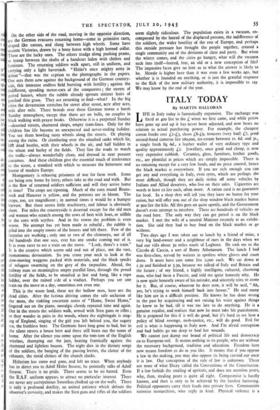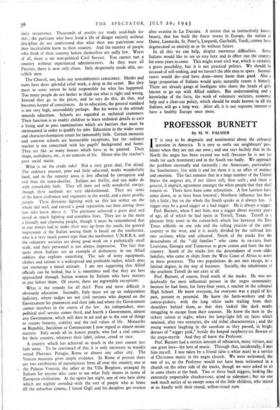ITALY TODAY
By MARTIN HALLORAN
LIFE in Italy today is fantastically expensive. The exchange was fixed at 400 lire to the £ when we first came, and while prices have gone up and up it has never been adjusted, and now bears no relation to actual purchasing power. For example, the cheapest cotton frocks cost kz-£3, shoes £8-k9, trousers (very bad) £7, good second-hand cameras lire t6o,000, ice-cream between as. 6d. and 3s., a single fresh fig 6d., a leather wallet of very ordinary type and quality approximately £2. Jewellery, once good and cheap, is now very expensive rubbish. Ceramics, glass, furniture, leather goods, etc., are plentiful at prices which are simply impossible. There is no rationing except for a very few foods, and no price control, hence the black market is everywhere. If you are rich enough you can get any and everything in Italy, even tyres, which are perhaps the most difficult, though they are daily stolen off army vehicles by Italians and Allied deserters, who live on their sales. Cigarettes are worth at least to lire each, often more. A ration card is no guarantee for food. In a shop they will tell you they have no butter for your ration, but will offer you out of the shop window black market butter at goo lire the kilo. All this goes on quite openly, and the Government doesn't even attempt to interfere. There are hundreds of vehicles on the road here. The only way they can get petrol is on the black market. I met the wife of a neutral Minister recently at an exhibi- tion. She said they had to buy food on the black market or go without.
Two days ago I was taken out to lunch by a friend of mine, a very big land-owner and a neighbour of ours in the days when we had our villa about 3o miles south of Leghorn. He took me to the Circolo di Caccia, a sort of Rome Athenaeum. The lunch I had was first-class, served by waiters in spotless white gloves and court dress. It must have cost some lire 2,000 each. We sat down at 1.3o and finished at 3.3o, because we talked of Italy and Britain and the future ; of my friend, a highly intelligent, cultured, charming man, who had been a Fascist, and told me quite honestly why. He is now quite honestly aware of his mistake, and sincerely tries to atone for it. But, of course, whatever he does now, it will be said, " Ah, yes, he's trying to work himself back into favour." He and many like him are in a difficult position. He knows he has done wrong in the past by acquiescing and not raising his voice against things he knew to be bad, till it was too late to do anything. He is a genuine royalist, and realises that now he must take his punishment. He is prepared for this if it will do good, but it's hard to see how a policy of blind revenge, mob-justice, etc., will do good. Evil for evil is what is happening in Italy now. And I'm afraid corruption and bad habits go too deep to heal her wounds.
We cannot just dump our brand of political life and democracy on to European soil. It means nothing to its people, who are without the necessary background, tradition and education. Freedom here now means freedom to do as you like. It means that if you oppose a law in the making, you may also oppose its being carried out once it is law. Our conception of the rule of law is unknown. There are none of what Dicey called the Conventions of the Constitution. If a law forbids the stealing of apricots, and does not mention pears, why, then, stealing pears is quite all right. Compromise is hardly known, and then is only to be achieved by the hardest bartering. Political opponents carry their feuds into private lives. Communists terrorise monarchists, who reply in kind. Physical violence is a daiiy occurrence. Thousands of youths are ready seed-beds for this ; the partisans who have lived a life of danger entirely without discipline do not understand that what then was patriotism now does incalculable harm to their country. And the number of people who think of their country before themselves are sadly few. Worst of all, there is no non-political Civil Service. You cannot run a country without experienced administrators. As they were all Fascists, there is now only chaos. Italy desperately needs able, un- selfish men.
The Church, too, lacks our nonconformist conscience. Monks and nuns have done splendid relief work, a drop in the ocean. But they must to some extent be held responsible for what has happened. Too many people do not bother to think ourt what is right and wrong. Instead they go to the priest, and he says do this, do that, and becomes keeper of consciences. As to education, the general standard is not very high, unavoidably perhaps. But far worse is the attitude towards education. Schools are regarded as technical crammers. Their function is to enable children to learn technical details to earn a living and to pass examinations which are barriers that must be surmounted in order to qualify for jobs. Education in the wider sense and character-formation count for lamentably little. Certain monastic and convent schools are honourable exceptions, but the ordinary teacher is not concerned with his pupils' background and home. They are like so many houses which have to be painted. Their shape, usefulness, etc., is no concern of his. Hence also the teacher's poor social status.
What is on the credit side? Not a very great deal, I'm afraid. The ordinary peasant, poor and little educated, works wonderfully hard, and in the remoter areas is less affected by corruption and evil than the town-dweller. Italians are thrifty, and can make do with remarkably little. They till their soil with wonderful energy, though their methods are very old-fashioned. They are some of the finest craftsmen and engineers in the world, and a most prolific people. Their divisions fighting with us this last winter on the whole did well, and earned a good reputation out here among those few who knew about it. The partisans achieved a great deal and saved us much fighting and countless lives. They are in the main a friendly and charming people, though it must be remembered that as our armies had to make their way up from the south, the general impression of the Italian among them is based on the southerner, who is a very much poorer type than the northerner. U.N.R.R.A. and the voluntary societies are doing good work on a pathetically small scale, and their personnel is not always impressive. The fact that quite often Italians see an example of dishonesty in our Allied 'soldiers also explains something. The sale of army equipment, clothes and rations is a widespread and profitable racket, which does not encourage a moral attitude. I am not suggesting that Allied officials can be bribed, but it is sometimes said that they are best approached through Italian women by Italians who have matters to put before them. Of course, these are regrettable exceptions.
What is the remedy for all this? First and most difficult is obviously education. Secondly, Italy must set up an independent judiciary, where judges are not civil servants who depend on the Government for promotion and their jobs and where the Government cannot interfere in the course of the law. An independent, non- political civil service comes third, and fourth a Government, almost any Government, which will dare to act and go to the root of things to restore honesty, stability and the real values of life. Monarchy of Republic, Socialism or Communism I now regard as almost minor matters. Italy needs all its honest people, who feel a real concern for their country, whatever their label, colour, creed or race.
A country which has achieved so much in the past cannot just fade away. To be convinced of this it is only necessary to wander round Florence. Perugia, Rome or almost any other city. The Vatican museum gives ample evidence. In Rome at present there are two exhibitions of masterpieces from all over the country, one at the Palazzo Venezia, the other at the Villa Borghese, arranged by Italians for anyone who cares to see what Italy means in terms of European civilisation. At the opera last night, one of two here alone which are nightly crowded with the sort of people who at home fill the suburban cinema, I heard Gigli and his daughter get ovation
after ovation in La Traviata. A nation that so instinctively knows beauty, that has built the finest towns in Europe, the nation of Dante, Leonardo, St. Peter's, Leopardi, Garibaldi, Verdi, cannot have degenerated so entirely as to be without future.
In all this we can help, despite enormous difficulties. Some Italians would like to see us stay here and in effect run the country for some years to come. This might avert civil war, which is certainly a grave possibility, but it is not practical politics. We should be accused of self-seeking, and we haven't the able men to spare. Second- raters would do—and have done—more harm than good. Also a large proportion of Italians would quite naturally resent it bitterly. There are already gangs of hooligans who shave the heads of girls known to go out with Allied soldiers. But understanding and a knowledge of the facts, the work of voluntary societies, economic help and a clear-cut policy, which should be made known to all the Italians, will go a long way. After all, it is our supreme interest to have a healthy Europe once more.



























 Previous page
Previous page